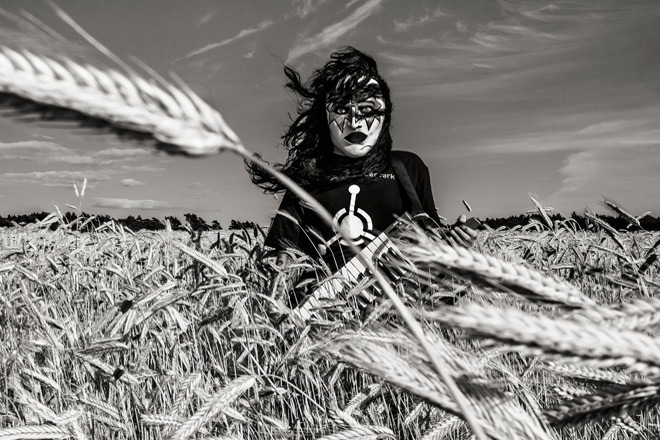
In December 2018, the band turned back the clocks for a special reissue record, celebrating the 25th anniversary of Soli Deo Gloria. Continuing into 2019, on March 22nd, APOP will release SDGXXV — available on CD, double-vinyl, and cassette — a collection of reimaginings and remixes of the original record by the likes of Ancient Methods, Cronos Titan, Beranek, Mortiis, Naked Lunch, Erik Wøllo, and many, many more.
In honor of the release of SDGXXV, we recently sat down with Stephan Groth, the man behind the magic of APOP, to talk about this exciting anniversary, his career and music, as well as what the future holds for Apoptygma Berzerk.
Cryptic Rock – Apoptygma Berzerk has been a band for nearly thirty years now. What have been some highs of the past three decades making music?
Stephan Groth – It’s been a roller coaster, but mostly highs fortunately! After so many years in the business, I can look back at an amazing career. I’m very privileged and happy that I’ve been able to make a living from making art for such a long time. I’ve had the chance to work with amazing artists and to travel the world. Also, I’ve had the privilege of playing an important role in the lives of many people. For this I am very grateful.
Cryptic Rock – Speaking from personal experience, your music has truly impacted many fans’ lives and it’s wonderful to know that you are aware of that. Now, in December 2018, you released a 25th anniversary reissue of Soli Deo Gloria, your debut album, and now you are gearing up to release a re-imagined version of the album, entitled SDGXXV. Looking back on the original record and all the doors it opened and the opportunities that it paved the way for, is there anything that you would have changed about the record?
Stephan Groth – Back then, we had no idea what we were doing and what impact this album would have for my future, and also for the electronic music scene in Norway. We did the best we could with the tools we had, and looking back, I think we did a great job.
However, when the idea of the 25th Anniversary Edition reissue came about, we also came up with the idea of inviting other artists to reinterpret the songs from the whole album. So, basically, we dove into a crazy idea and job of inviting artists we respect to make reinterpretations and changes to the record, changes that they felt they wanted to make. But for me personally, no I wouldn’t change anything.
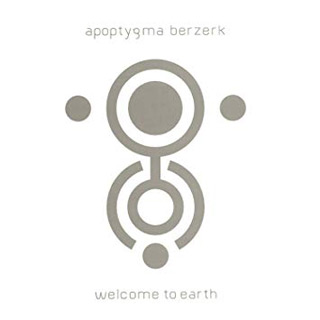
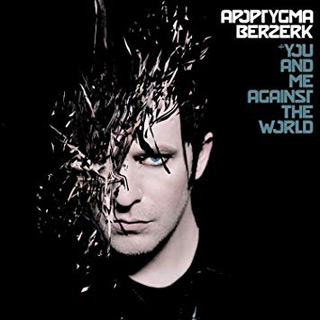
Cryptic Rock – Despite the time that has passed, the album holds up well. Which, in fact, is the next question: do you feel that Soli Deo Gloria has stood the test of time and is still as strong an album as it was 25 years ago?
Stephan Groth – You can absolutely hear that it was recorded a long time ago, but I think that the energy, creativity and vibe is still working today. Especially when listening to the SDGXXV album with reinterpreted versions, we hear it with new ears and see it with different glasses on, and then it becomes clearer to us what we really accomplished back then.
Cryptic Rock – Speaking of back then, if 2019 Stephan Groth could whisper into the ear of 1993 Stephan, who is in the studio recording Soli Deo Gloria, what advice would he give his younger self?
Stephan Groth – I would shout not whisper: “Stop making music, get a ‘real’ job!” (Laughs) No, just kidding! Do your own thing, don’t compromise, and don’t care what other people think about your art!
Cryptic Rock – (Laughs) All excellent advice, not just for musicians, but for any artists. So, on the record, you covered The Velvet Underground’s “All Tomorrow’s Parties,” and you’ve gone on to do quite a few covers throughout your career. What goes into your decision to cover (or not cover) a particular song?
Stephan Groth – Usually it is an homage to the original track/artist, and most of the songs I have made a cover of have been important to me in my youth or in my musical background. So, to understand APOP completely, you need to know my roots and this is my way of showing you where I come from. To me, The Velvet Underground and their infamous “banana” album have been particularly important; hence this was the second song ever covered in the history of APOP. The first being “The Model” by Kraftwerk.
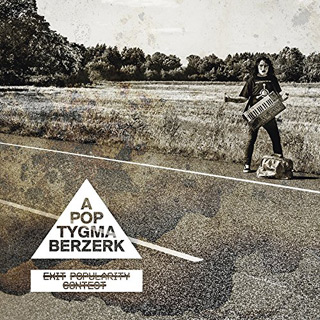
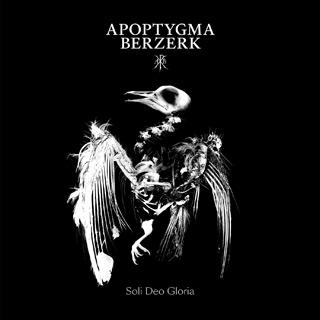
Cryptic Rock – It’s excellent that you are choosing to cover material that you are personally invested in; music that made you the musician you are today. Beyond covers, you have gone on to remix music from a truly impressive and eclectic array of other musicians – everyone from VNV Nation to Good Charlotte, to Satyricon. Is there anyone whom you haven’t worked with that you aim to collaborate with one day?
Stephan Groth – Speaking of The Velvet Underground in the previous question, I actually got to make a remix of Nico’s version of “All Tomorrow’s Parties,” and that is also part of the highs in my career in the first question – a real highlight, something I am really proud of. In general, I love to do remixes, but at the moment, the focus is 100% on new APOP material. However, I can assure you that there will be more interesting collaborations and remixes in the future.
Cryptic Rock – We look forward to hearing any and all new music that you create, no matter the genre. In fact, throughout Apoptygma Berzerk’s career, you have explored so very many facets of music, from Synthpop and Futurepop to more guitar-driven Rock, to some wonderful covers and far beyond. Soli Deo Gloria was the launching pad for that career, but looking to the future, where is APOP headed next?
Stephan Groth – Exit Popularity Contest (2016) was 100% electronic and we are going to continue in that direction, but now with added vocals and more typical APOP songs. At the moment, I’m heavily into modular synths and therefore more focused on an electronic feel all together.
Cryptic Rock – APOP never disappoint, so the future seems very bright. Speaking of, what can fans expect for 2019, and, additionally, will North American fans be seeing you perform on our soil in the coming year?
Stephan Groth – New material, live-gigs, back-catalog reissues, collaborations and remixes are already in the pipeline. The fall of 2019 is booked with gigs in Europe, and sorry to say, but so far we have no scheduled plans for any appearances in the U.S.
Cryptic Rock – That is very exciting and certainly U.S. fans can hold onto hope for the future. Although, sadly, APOP has never risen to a (well-deserved) level of prominence here in North America. Invariably, someone will read this interview and not know your extensive catalog of music. So, if you had to boil it all down and provide them with three tracks to represent Apoptygma Berzerk’s music, which three songs would you choose?
Stephan Groth – Aaaaaah, where to start? “In This Together,” “Kathy’s Song,” and “Until The End Of The World” – but that’s if you just want to touch the tip of the iceberg and check the hits. If you really want to know what APOP is about, I’d recommend: “Unicorn (Duet Version),” “Shadow,” and “Dead Air Einz.”
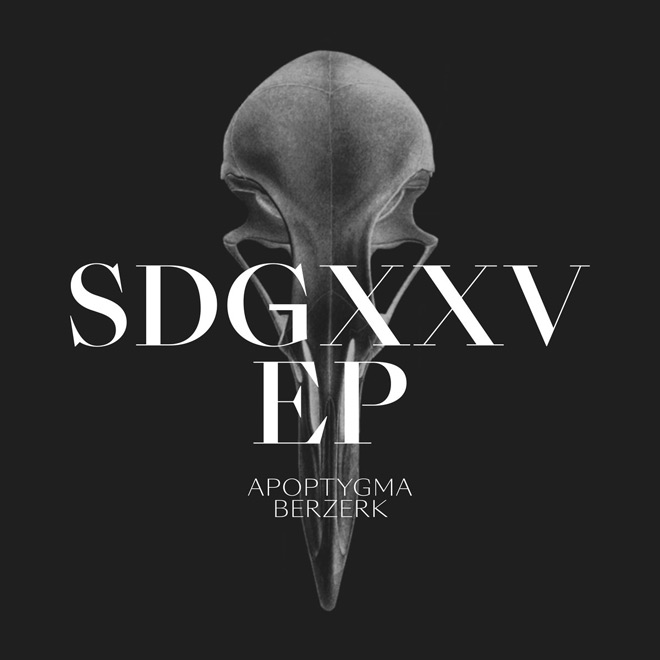
Cryptic Rock – Also, “Starsign” would be a stellar recommendation. Totally random, and a bit late in the game, but do you have any favorite albums of 2018?
Stephan Groth – Ancient Methods’ The Jericho Records is definitively a favorite. Also, Chris Carter’s CCCL Vol. 1 is amazing, and it was great to see Sound Of Danger by Beranek finally getting a well deserved reissue on CD/LP.
Cryptic Rock – Some diverse choices there. Last question. At Cryptic Rock, we cover music as well as films – particularly Horror and Science Fiction. Are you a fan of either of these genres and, if so, do you have any favorite Horror and/or Sci-Fi films?
Stephan Groth – I grew up as a huge fan of Sci-Fi and Horror movies, and searching for those obscure VHS tapes back in the day was almost as important as digging crates for 7” and 12” vinyl. I have releases named “Deep Red,” “Videodrome,” and “Jennifer Corvino,” so obviously Horror movies were a source of inspiration.
What turned out to be even more important was the soundtracks that came with these movies, so John Carpenter is very important for me – both for his films but especially for his music. This was one of the reasons that Exit Popularity Contest, the last full-length APOP album, ended up sounding the way it does. If you want to chase this rabbit down the hole, check out the track “The Devil Pays In Counterfeit Money.”






No comment